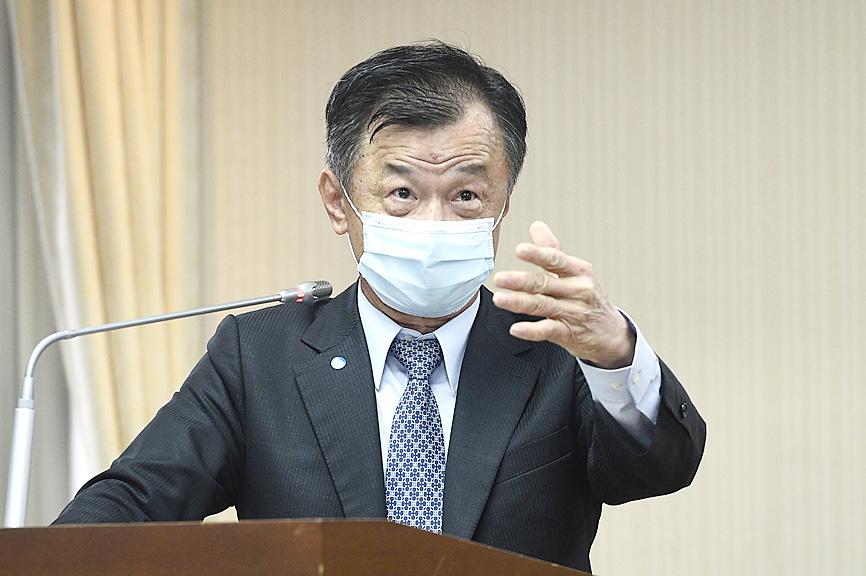Legislators yesterday called for an amendment to the law governing Hong Kong and Macau affairs to prevent Chinese-funded enterprises poaching Taiwanese talent and infiltrating the nation.
Mainland Affairs Council (MAC) Minister Chiu Tai-san (邱太三) said that amending the Laws and Regulations Regarding Hong Kong & Macau Affairs (香港澳門關係條例) is a serious matter, and promised to discuss the issue with the Ministry of Economic Affairs (MOEA).
Chinese-funded enterprises often disguise themselves as foreign-funded or Hong Kong-funded firms to evade regulations, Democratic Progressive Party (DPP) Legislator Lo Mei-ling (羅美玲) said at a question-and-answer session at the legislature.

Photo: George Tsorng, Taipei Times
The Investigation Bureau discovered 33 such cases since 2020, Lo said.
Of the 33 enterprises, 19 were disguised as Taiwanese-funded; 11 were funded by overseas Chinese, foreign nationals or Hong Kong sources; two secretly set up private research and development centers in Taiwan; and one was a Chinese company that opened an office in Taiwan, Lo said.
About 500 to 600 people were involved in these cases, contravening the Act Governing Relations Between the People of the Taiwan Area and the Mainland Area (兩岸人民關係條例), she added.
Lo requested that Article 31 of the Hong Kong and Macau act be reviewed and amended to safeguard national security, economic development and Taiwan’s industrial advantages.
Chinese companies poaching Taiwanese talent used to be governed by the Trade Secrets Act (營業秘密法), but the National Security Act (國家安全法) has to be amended when core technologies are involved, Chiu said.
Regarding the Hong Kong and Macau Act, the government has been revising relevant regulations as the two regions are no longer colonies, Chiu said, adding that the government would intervene if more than 30 percent of a company’s funding comes from Chinese sources.
Meanwhile, DPP Legislator Michelle Lin (林楚茵) questioned the government’s proposal to amend the Act for Promotion of Private Participation in Infrastructure Projects (促進民間參與公共建設法) while the MAC is simultaneously clamping down on Chinese-funded enterprises.
The amendment would allow investment from foreign-funded firms in key infrastructure projects, such as green energy, railroads and transportation, she said.
If the proposed amendment takes effect, Chinese-funded enterprises could easily channel funding through companies registered abroad to infiltrate Taiwan, she said.
Chiu said that investment in certain fields is clearly forbidden by the MOEA, adding that the government would strictly regulate Chinese-funded firms.
However, the government would consider revising the regulation on funding from Hong Kong, he added.

POSITIVE DEVELOPMENT: Japan and the US are expected to hold in-depth discussions on Taiwan-related issues during the meeting next month, Japanese sources said The holding of a Japan-US leaders’ meeting ahead of US President Donald Trump’s visit to China is positive news for Taiwan, former Japan-Taiwan Exchange Association representative Hiroyasu Izumi said yesterday. After the Liberal Democratic Party’s landslide victory in Japan’s House of Representatives election, Japanese Prime Minister Sanae Takaichi is scheduled to visit the US next month, where she is to meet with Trump ahead of the US president’s planned visit to China from March 31 to April 2 for a meeting with Chinese President Xi Jinping (習近平). Japan and the US are expected to hold in-depth discussions on Taiwan-related issues during the

‘LIKE-MINDED PARTNER’: Tako van Popta said it would be inappropriate to delay signing the deal with Taiwan because of China, adding he would promote the issue Canadian senators have stressed Taiwan’s importance for international trade and expressed enthusiasm for ensuring the Taiwan-Canada trade cooperation framework agreement is implemented this year. Representative to Canada Harry Tseng (曾厚仁) in an interview with the Central News Agency (CNA) said he was increasingly uneasy about Ottawa’s delays in signing the agreement, especially as Ottawa has warmed toward Beijing. There are “no negotiations left. Not only [is it] initialed, we have three versions of the text ready: English, French and Mandarin,” Tseng said. “That tells you how close we are to the final signature.” Tseng said that he hoped Canadian Prime Minister Mark Carney

President William Lai (賴清德) yesterday bestowed one of Taiwan’s highest honors on Saint Vincent and the Grenadines (SVG) Ambassador Andrea Clare Bowman in recognition of her contributions to bilateral ties. “By conferring the Order of Brilliant Star with Grand Cordon on Ambassador Bowman today, I want to sincerely thank her, on behalf of the Taiwanese people, for her outstanding contribution to deepening diplomatic ties between Taiwan and SVG,” Lai said at a ceremony held at the Presidential Office in Taipei. He noted that Bowman became SVG’s first ambassador to Taiwan in 2019 and

A man walks past elementary school artworks at the Taipei Lantern Festival in Ximen District yesterday, the first day of the event. The festival is to run from 5pm to 10pm through March 15.